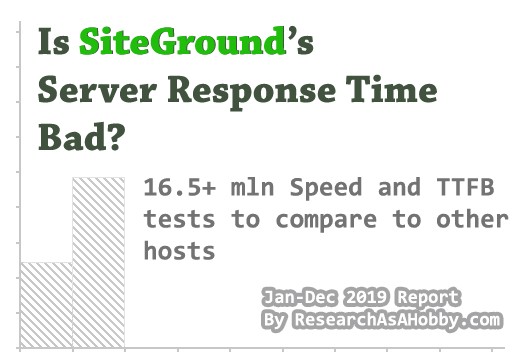
Last year I published a research on SiteGrounds’s performance so that you could see if its Time To First Byte (or Server Response Time) is bad or good compared to other 14 hosts that I have been monitoring. The research included the results of 16.5 mln tests.
And now, one year later, after testing 15 shared host non-stop 24/7 during 365 days of the year 2019 I’ve accumulated another set of 16+ mln measurements of 15 shared hosts’ performance including SiteGround’s Server Response Time (also known as Time To First Byte) and speed.
Okay, it’s time to reveal the research and compare the performance of SiteGround and other 14 well-established hosts for the whole year! Enjoy the tables and the charts! 🙂
Please note that although all hosts mentioned in this post are well-established and considered to be very good, I highly recommend not all of them. My recommended hosts are on this page (including SiteGround, you can see my short review of this host here).
How I collected the 16.5 mln of SiteGround’s and other hosts’ Server Response Time and speed tests
My subscribers know that I’ve been recording the performance of SiteGround and other 14 shared hosts since 2016 and publish reports monthly.
If you want to read more about the methodology of the monitoring, you can go here.
In short, the methodology is like this:
- I anonymously buy the smallest hosting plans from 15 hosts (I use US locations).
- I install WordPress, add some content which consists of a dozen of articles and images to imitate a simple typical main page of a website.
- I use a monitoring service (monitis.com) to watch and record how the hosts perform in a non-stop manner. I use two monitoring locations (US East and West) to make the results more precise to minimize false positives.
There are two types of regular tests included in the hosting monitoring: uptime and speed tests:
- Uptime tests run every minute from two locations and contain information about Server Response Time (Time To First Byte).
- And speed tests (Full Page Load Time tests to be specific) run every 20 minutes also from two US locations.
The daily reports that I use contain the daily average values on speed and Server Response time for each host, including SiteGround. Thus, I’ve got 365 daily reports on the hosting performance and put them together into a spreadsheet to analyze.
SiteGround’s Server Response Time and speed compared during the whole year
Here are the daily average Server Response Time (Time To First Byte) for SiteGround and other 14 hosts on the chart below. In total, there are 365 values for each hosting displayed:

Look at the chart above. Even without statistical analysis you can see that SiteGround’s Server Response Time is one of the best compared to other hosts.
Also, Server Response Time of SiteGround does not fluctuate from day to day much (unlike some other hosts which TTFBs do fluctuate). This is a great sign that the SiteGround’s shared server where my site is hosted is managed very well. Note that I’m using the cheapest plan, so this is the cheapest hosting plan with SiteGround.
Anyway, there was actually just one host which had a better Server Response Time. And this host is HawkHost (I’ve got a short review of this host here).
But as you can see in the legend at the bottom of the chart, although HawkHost had better Server Response Time, the host was a bit slower than SiteGround on average. So, just a remark that better Server Response Time does not necessarily mean a better speed.
There’s another positive point that you can see on the chart above. SiteGround not only had a great Server Response Time values, but also the values are quite stable during the whole year. It indicates that SiteGround has a great server management.
Since I’ve mentioned hosting speed and that in the end speed is actually more important than Server Response Time, here’s another killer chart for you. SiteGround speed compared to other hosts during 365 days:

As you can see in the legend at the bottom of the chart, SiteGround had the best average speed. Moreover, its speed did not fluctuate much which is an indicator of a reliable service. You can also see the monthly distribution of average speed and Server Response Time of SiteGround and compare it with other hosts on the charts here.
I’d say for an ordinary user the information I have provided above can be sufficient. You can draw the conclusion about what Server Response Time can be considered to be okay and how SiteGround compared to other hosts.
Meanwhile, superb Server Response Time and even brilliant speed are not enough to consider a hosting a great choice in a general case.
Now let’s deepen the analysis of SiteGround’s Server Response Time. I’d like to show you a more thorough comparison of SiteGround’s performance and other 14 hosts. Average values of Server Response Time and the daily chart above speak a lot, but some details get lost when all the hosts are put together on one chart.
Important note: Why Server Response Time should not be used to evaluate a hosting speed
An important point that I already mentioned is that Server Response Time (or Time To First Byte) has not much to do with the hosting performance from a visitor’s point of view. Moreover, I have previously posted a few researches on how Server Response Time is connected with Hosting speed using the real-life data of after I got the millions of the test results in 2016, 2018 and 2019.
The main conclusion of these researches is the following: “Do NOT judge hosting speed by checking only Server Response Time”. I’ve noticed that some hosting reviewers try to present hosting speed by measuring only the hosting Server Response Time. This is very wrong in many ways. Yes, it’s much cheaper and easier to measure Server Response Time. But what really matters is a real hosting speed (technically this is called Fulll Page Load time).
At the same time it’s partly true that usually the hosts with great speed have great Server Response Time. But it does NOT mean that the better Server Response Time results to the better hosting speed.
Server Response Time (or Time To First Byte, TTFB) can be used as a part of hosting performance analysis to see how a hosting server behaves regardless of the size of the website and avoid the influence of the database. TTFB can be also used for analyzing a particular website or server configuration. So, the investigation of Server Response Time is quite limited. And it should not be used for estimating a hosting speed directly.
Although there may be a correlation between hosting speed and Server Response Time (TTFB), it’s not a solid dependency. And it’s individually for each host.
For example, in case with SiteGround, this host has both brilliant Server Response Time and Full Page Load Time (speed). But some hosts may have even better Server Response Time, whereas their speed is noticeably worse (see the next chapter to see the examples).
Besides, with some specific website configuration Server Response Time can be seemingly bad, whereas hosting itself is fast. It also depends on whether you do enough tests to draw your conclusions (single tests can be misleading!)
Also, for example, Server Response Time can differ by multiple times depending on a particular hosting and whether a caching solution is used. You can see my detailed research on this topic with lots of manual tests.
SiteGround’s Server Response Time and its real-life speed compared to other hosts
As I mentioned above, Server Response is not important as a single metrics. Much more important is the hosting speed. And combining the analysis of Server Response Time values (or Time To First Byte, TTFB) with the real-life hosting speed is indeed useful.
Here are the yearly reports on average Server Response Time (Time To First Byte, TTFB) and Full Page Load Time (hosting speed). They are provided by the hosting performance monitoring service. I selected the areas on the screenshots below which are the most important for analysis and which are the source data for the charts that I will show you later.
The report with hosting speed data:

The report with Server Response Time data:

And here on the chart below you can see the disposition of the hosting real-life average speed and server response time calculated for 2019. Siteground’s Server Response Time (Time To First Byte) is selected as the center of the analyzed segments. The segments display which hosts are better or worse than SiteGround from the TTFB and hosting speed point of view:
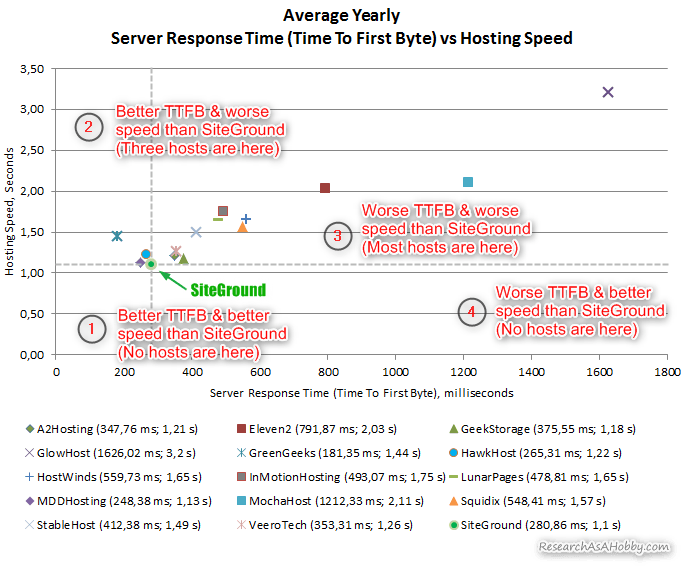
This chart is interesting from several perspectives.
Before all, look at fast SiteGround’s performance. It’s the fastest host among 15 providers. But it does not have the best Server Response Time (TTFB). And this is normal. Since TTFB is just a part of the hosting speed which does not ultimately define the hosing speed. Anyway, SiteGround has a great Server Response Time (TTFB).
Now let’s have a look at the sections on the chart that I marked from 1 to 4.
The section 1 contains the hosts which are faster and have better Server Response Time (TTFB) compared to SiteGround. As I mentioned above, no host was faster than SiteGround. And that’s why this section contains no hosts. SiteGround is the winner.
The section 2 is probably the most intriguing. It contains the hosts which have better Server Response Time (TTFB) but are slower than SiteGround. There are three out of fifteen hosts in this section. These cases are not isolated. But instead – the fact that “better TTFB does NOT mean better hosting speed” proves that you should not estimate or compare hosting speed by evaluating only Server Response Time (TTFB).
The section 3 contains the slower hosts with worse Server Response Time (TTFB) than SiteGround. This section sort of confirms most people’s expectations. It shows that the worse Server Response Time the slower the hosting on average. But even within this section you can see that some hosts may have better Server Response Time, but worse speed. And it proves again that Time To First Byte cannot be a solid measurement for evaluating hosting speed.
The section 4 is for the host which are faster than SiteGround but have worse Server Response Time (TTFB). No hosts in this section. There are no hosts faster than SiteGround at all 🙂
After all, there are two main takeaways from analysis of the chart:
- SiteGround has a great Server Response Time, and the best hosting speed recorded.
- In general, there is a sort of a tendency “the better Server Response Time (TTFB), the better hosting speed. But whereas it’s true for several hosts, many others break that tendency pretty often. I.e. don’t judge hosting or compare speed of hosts by testing only their Server Response Time.
Server Response Time of SiteGround compared to other hosts using histograms
You could see the Server Response Time of SiteGround and other hosts displayed on the chart in the section above. It’s good for a very general overview of siteGround’s performance. But that chart is not good if you are interested in details. To give you more interesting insights, I’ve prepared histograms presenting each of the 14 hosts’ Server Response Time data in comparison with SiteGround’s data.
If you don’t know what a histogram is for, this is simple. A histogram is good for analyzing a big set of values by grouping the values.
My histograms show how frequently Server Response Time values get into the specified ranges. Thus, instead of hundreds of Server Response Time values you get just several values which let you know in a condensed way how good Server Response Time SiteGround has compared to each of the other hosts.
Let’s start from the histogram of SiteGround’s Server Response Time data:
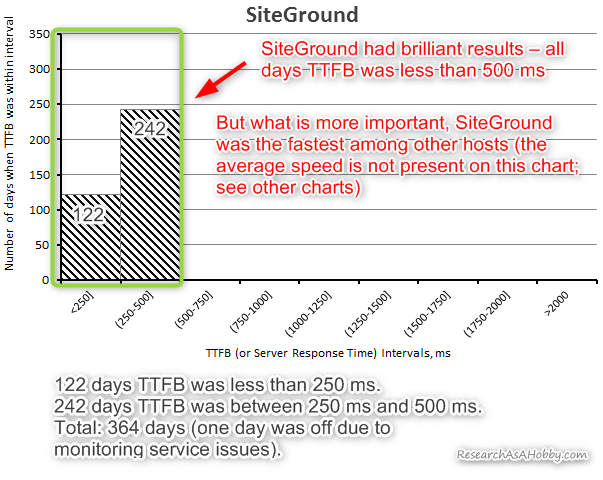
Server Response Time (Time To First Byte, TTFB) below 500 milliseconds is great. And all of the TTFB values of SiteGround (i.e. average daily values) get into this range (the first two intervals on the chart).
I’d like to show you also the histogram charts for other hosts. There are two types of charts:
- A histogram of Server Response Time (TTFB) for each of the rest 14 hosts. And the second type of chart contains SiteGround’s data overlaid with other host’s data for comparison.
- Simply speaking, the higher two bars the better. The more number of bars (and the higher they are) on the right-hand side of the chart, the worse.
Here we go!
Notice: in the following chapters I compare yearly average Server Response Time (Time To First Byte or TTFB in short) and speed of SiteGround to other hosts. Also, in the descriptions I add links to my SiteGround review and my affiliate links to some other hosts from my recommended list. Although this may look like a shameless repetitive plug (and it’s actually so LOL), I do seriously recommend SiteGround as my first recommended host. AND this is far not only because of its awesome speed and great Server Response Time.
Is SiteGround’s Server Response Time bad? Compare to A2 Hosting
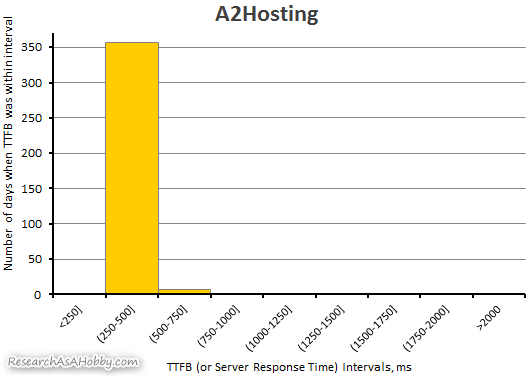

SiteGround’s Server Response Time (and SiteGround’s speed) are pretty close to A2 hosting’s performance. You can notice that SiteGround’s Server Response Time is a little bit better than A2’s on average, as well as SiteGround is faster. Keep in mind I compare the cheapest plans of the both hosts.
A2 Hosting is a SiteGround’s competitor. Both hosts target similar hosting clients. However, A2 is focusing its strategy more on providing its clients speed tuning options. And SiteGround works hard to satisfy users with a wider range of services. Anyway, my non-stop testing shows that A2 provides a very good performance which is comparable to SiteGround, although A2 Hosting is slightly a cheaper host.
You can read my short review on A2 if you are interested. But if you also read my review on SiteGround, you will know that I recommend SiteGround first of all.
Is SiteGround’s Server Response Time bad? Compare to GeekStorage
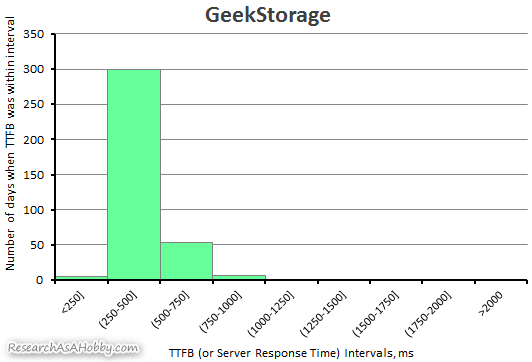

GeekStorage is one of the most affordable hosts. And regardless, its performance is very good and comparable to the speed and the Server Response Time of SiteGround. My tests show that GeekStorage had been even better in terms of performance than SiteGround from 2016 to 2018 inclusive.
In 2019 GeekStorage had slightly worse Server Response Time compared to SiteGround and GeekStorage was a bit slower. But compared to other hosts, GeekStorage had awesome performance.
SiteGround is a more universal and versatile hosting. It satisfies a bigger and wider audience because the host offers more options, tools and more approachable support. Thanks to stellar performance, feature-rich ecosystem and friendly support, SiteGround is a great option for both newbies and pros.
GeekStorage focuses on providing affordable and well-performing hosting with efficiently decent support. It’s more for technical people. If you are interested in reading my more detailed review of GeekStorage, here it is.
Is SiteGround’s Server Response Time bad? Compare to HawkHost
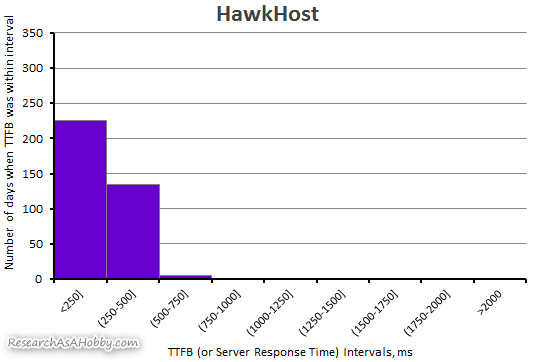

HawkHost is one of the few hosts that have better Server Response Time (TTFB) compared to SiteGround. But HawkHost is a bit slower at the same time. It confirms that a better Time To First Byte does not mean a better hosting speed.
HawkHost is a much smaller and a very affordable host. It’s one of the hosts that I recommend (here’s my short review of this host).
Of course, SiteGround is more reliable and reputable choice (my short review). But HawkHost is for those who want to save as much as possible and get a comparatively great service.
Is SiteGround’s Server Response Time bad? Compare to GreenGeeks

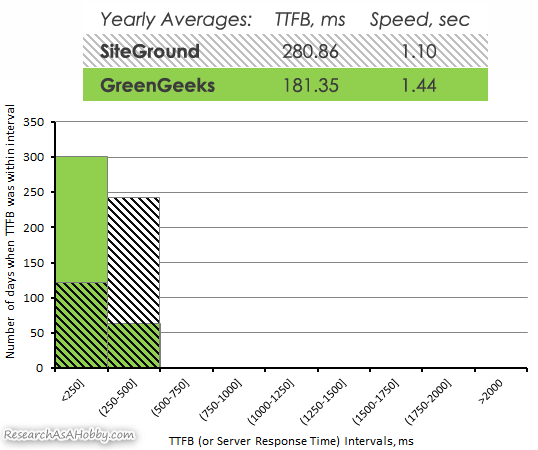
GreenGeeks is another good example which demonstrates that even if a host has a better Server Response Time, it does not mean that it has a better speed. Although GreenGeeks has a superb Server Response Time (TTFB) which is the best of all 15 hosts I’ve been monitoring, this host is far not the fastest (although its speed is still pretty good I’d say).
Some people consider GreenGeeks to be an alternative to SiteGround. And it is in some ways. However, GreenGeeks is a cheaper host considering the allocated resources per price. SiteGround is a more sustainable host (here’s my short review).
Is SiteGround’s Server Response Time bad? Compare to MDD Hosting

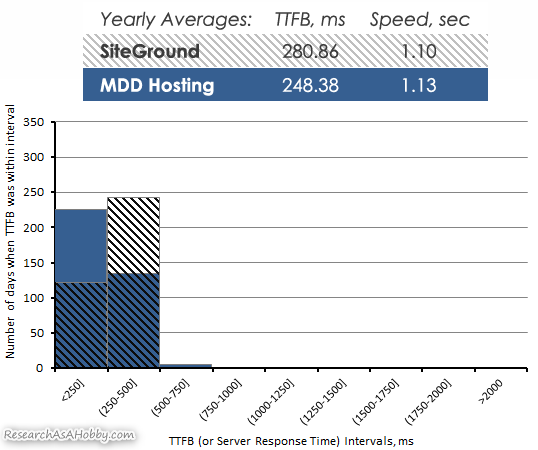
MDD Hosting is another example which demonstrates that better Server Response Time does not guarantee a better hosting speed.
MDD Hosting had slightly better Server Response Time and slightly worse speed compared to SiteGround. I recommend MDDHosting for people who appreciates very small hosting with affordable prices (see more details in my short review).
Although for some people MDD can be a good choice, I suggest SiteGround in the first place. Compared to MDD, SiteGround is a more reliable option with more tools and features. And SIteGround support is more approachable (more ways to communicate, more comfortable for not technical people). My SiteGround’s short review is here.
Is SiteGround’s Server Response Time bad? Compare to VeeroTech
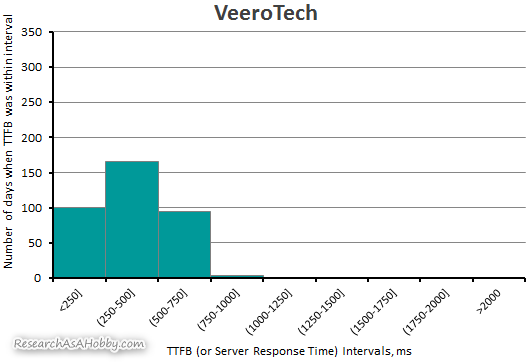
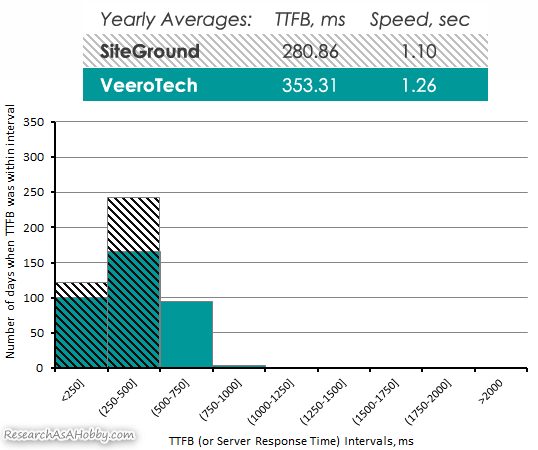
Although you can see that VeeroTech has a bit worse Server Response Time and speed than SiteGround, it is a very fast host.
VeeroTech is not as popular as SiteGround, but it has its fans (here’s a short Veerotech review).
SiteGround has many more fans. And this is for a number of reasons (the review)
Is SiteGround’s Server Response Time bad? Compare to StableHost


StableHost’s Server Response Time (TTFB) is great but worse than SiteGrounds’ TTFB. As regards speed, SiteGround is noticeably faster.
StableHost is really good from a performance point of view. However, its clients support and client satisfaction is really worse than the satisfaction that SiteGround’s clients get.
SiteGround is a more advanced and better host, no doubt (review).
Is SiteGround’s Server Response Time bad? Compare to Squidix


Squidix has a bit worse Server Response Time compared to SiteGround. As well as speed. Nevertheless, Squidix’ performance is great. SiteGround is simply better.
Unlike SiteGround, Squidix is a small hosting. As I say in my short review, Squidix’ strong side is in more personalized technical support. Much fewer people choose Squidix. SiteGround is a more solid and advantageous choice in most cases (you can read my short SiteGround review here).
Is SiteGround’s Server Response Time bad? Compare to HostWinds
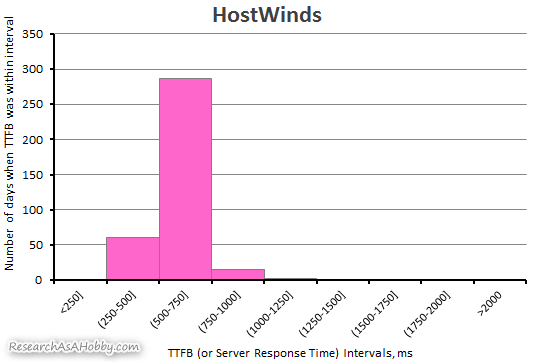
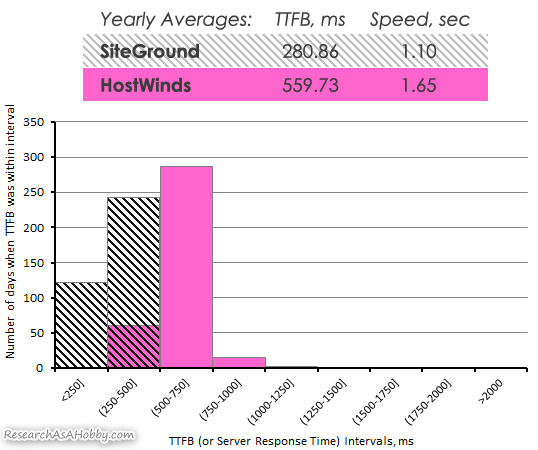
The Server Response Time and hosting speed of HostWinds’s performance is comparatively worse than the performance of SiteGround. Anyway, HostWinds’ performance is pretty good.
So, if you are choosing between these two hosts, SiteGround is no dobout a more reliable option from many perspectives (here’s my SiteGround review in short for additional information).
Is SiteGround’s Server Response Time bad? Compare to LunarPages
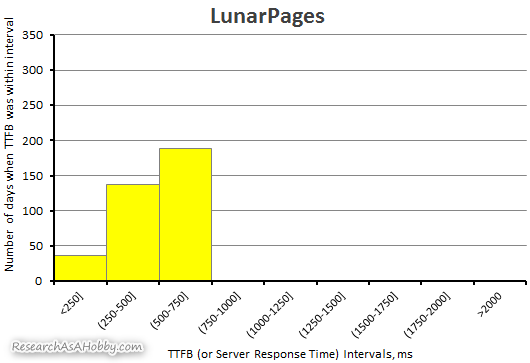

LunarPage’s Server Response Time (TTFB) values are great, although worse than SiteGround’s Server Response Time. The same is about the hosting speed. SiteGround is noticeably faster, although LunarPages is good too.
In short, compared to LunarPages (acquired by HostPapa), SiteGround is a better performing host and has more features plus more approachable support (you can see my short SiteGround review here).
Is SiteGround’s Server Response Time bad? Compare to InMotionHosting

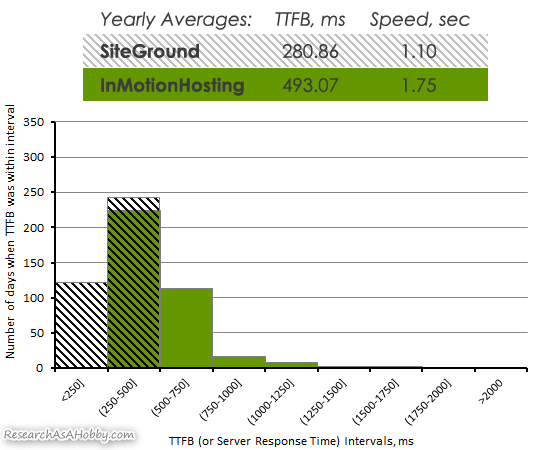
InMotionHosting is the last host from my testing set which has not bad Server Response Time (althought it’s worse than Server ResponseTime of SiteGround). However, speed of InMotionHosting is considerabl worse than SiteGround’s.
After all, InMotionHosting is a moderately well performing host. And although IMH is trying to attract the same kind of clients as Siteground, SiteGround is a stronger option from many perspectives (my short SiteGround review explains the stronger points).
Is SiteGround’s Server Response Time bad? Compare to Eleven2


Although Eleven2 is considered to be one of the well-known shared hosts, it is not a competitor to SiteGround at all. As regards technical performance, SiteGround has much better both Server Response Time and hosting speed.
The advantages of SiteGround go beyond its performance (my SiteGround’s short review is here).
Is SiteGround’s Server Response Time bad? Compare to MochaHost

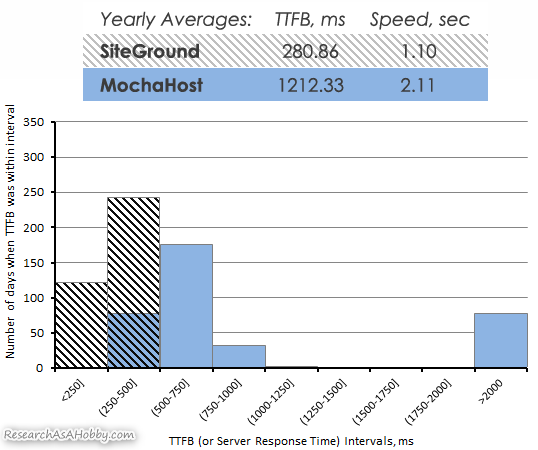
MochaHost has not good Server Response Time (TTFB). But this would not be a problem if the host had a good speed. But the speed was also not impressive.
What is interesting regarding the host’s TTFB is that it was not stable (notice the bar which stands on the right-hand side apart from others). In other words, TTFB was more than 2 seconds during 77 days, whereas on other days TTFB was within 500-750 ms. There was something wrong with the host performance during those 77 days.
Of course, SiteGround is much more stable and better performing host. Not to mention other advantages that SiteGround has (here’s my short review).
Is SiteGround’s Server Response Time bad? Compare to GlowHost


GlowHost is quite a well-known host. But compared to SiteGround’s both Server Response Time and hosting speed GlowHost is awfully performing hosting. SiteGround is definitely much better from performance point of view. As reagrds other SiteGround’s advantages, here’s my short review).
SiteGround and its Server Response Time: questions and answers
After analyzing the charts and data you still may have some questions about Server Response Time of SiteGround. Here are the answers to several questions about SiteGround performance that people ask now and then.
Can a bad Server Response Time make SiteGround slow?
If any hosting, including SiteGround, has a bad Server Response Time, then it does NOT make the host automatically bad performing and your sites hosted there don’t become slow.
At the same time, bad Server Response Time CAN be a reason why the hosting is slow. If a bad TTFB (Time To First Byte is another commonly used term for Server Response Time) is connected with network issues, which are hosting-independent, then no reason to blame the host.
But if the guilty party is the hosting server itself (e.g. because of the bad management) then yes, the slowness of the host may be rooted to the bad TTFB.
How can you make sure what is guilty in a bad TTFB? Multiple (or better continuous) testing from different locations can help you find it out.
Since SiteGround is known for a great server management, it’s very unlikely that SiteGround will be slow because of the issues with Server Response Time. The millions of tests of SiteGround shared hosting server located in the US reveal a brilliant performance of SiteGround since 2016. It regards both Server Response Time and speed (Full Page Load Time).
Anyway, if you suspect that SiteGround in your case has bad Server Response Time, make sure that this is not a network issue. I.e. test from different locations and analyze TTFB in each case. And of course, pay attention to a final hosting speed, this is what you need to take care after all.
Also, as a user, you may want to improve your website speed, not Server Response Time (TTFB).
Can a good Server Response Time make the website hosted with SiteGround faster?
It’s believed that the better Server Response Time, the better speed. But this is not completely true. The point is that improving Server Response Time (on any host, not just SiteGround) should not be your primary aim.
What you should take care of is the speed. Improving Server Response time does not guarantee your website speed improvement. Sometimes it can even result into slower website or less stable performance (e.g. see this research).
This research shows brilliant performance of SiteGround, but can this host have a bad Server Response Time?
Theoretically, of course it can. Practically, SiteGround has been proving for years to be one of the best performing hosts with great Server Response Time (and what is much more important, with superb speed). For data proof, see my detailed research of Server Response Time (Time To First Byte) and comparison for the following years: 2016, 2018, 2019.
I have a website hosted with SiteGround and I have bad Server Response Time. What should I do?
This can happen actually with any hosting. Depending on network quality, server location, your location (testing location) your experience may differ. In case with a high-quality hosting (which SiteGround is), the issues like that are not likely to take place, but anyway here are my advice for you:
- If you website is as fast as it is expected, simply don’t pay attention to Server Response Time (or TTFB). There are many reasons why TTFB may seem not so good, but the speed may be okay at the same time.
- If you website is slow, then blaming Server Response Time does not make much sense until you eliminate other factors. In other words, optimize your website speed is what you should do first of all (I know this is a difficult and a vast topic).
- If you still think that it may be Server Response Time that makes your website slow, then I suggest making these simple steps to check it:
- Creating a simple HTML page without requests to a database (e.g. a pure HTML page), and a simple page with requests to a database. (e.g. install a new WordPress site).
- Testing Server Response Time of a pure HTML page. It will show you the result excluding influence of the database (this can give you a better estimation of the actually the Server Response Time). And testing TTFB of an empty WordPress site will give you the result including database access time (comparing it to the previous testing can give you insights about the issues with the database latency).
- Doing multiple tests of Server Response Time (at last 3 for each case, but the more the better). If you do few tests, there are good chances that your conclusions may be wrong because Server Response Time measurements fluctuate much (see the real-time TTFB charts here and read my research about this topic).
- Analyzing the Server Response Time tests. If multiple tests of the pure HTML page show normal Server Response Time, then the problem of slow website is somewhere else. In case the Server Response Time is bad, you need to find out whether the problem appears at the server level, not on the way between the testing location and the server (e.g. there can be network issues connected with DNS). Doing multiple tests in different time from different world locations can provide you with good insights.
Conclusion
Server Response Time (also known as Time To First Byte or TTFB) is a technical term that due to some reasons got attention of non-technical owners of websites. Many websites owners, including SiteGround clients, believe that Server Response Time affects hosting speed and that it’s better to have it as little as possible. And although this is true, it’s not that simple and straightforward.
In short, everyone should keep in mind that it is not Server Response Time which is important, but the speed is what matters in fact. And although Server Response Time is a part of the hosting speed, there’s no solid dependency that the better TTFB, the better hosting speed. This is also true for SiteGround.
There are hosts which have better Server Response Time, but worse speed. As a result of monitoring the performance of 15 hosts during the whole year 2019 (16.5 mln tests), no host was faster than SiteGround. And this is what matters before all.
And in addition to that, SiteGround’s Server Response Time was less (which means better) and more stable than the most of the other hosts.
P.S.: I recommend SiteGround above all other hosts which suit most of the website owners. And this is the first hosting option not only because SiteGround has great Server Response Time and speed, but because of other advantages that I mention in my short review.

BTW, I respect your privacy, and of course I don't send spam, affiliate offers or trade your emails. What I send is information that I consider useful.




Not my experience with Siteground at all, I’ve consistently measured sub-par TTFB compared to better hosting providers that I’ve worked with.
Perhaps, but the final speed is what matters the most.
Hello Michael,
This is a very knowledge-packed article on improving the speed of the website. Will optimize it in my blog for sure!!
Thanks…
Hello Jones,
Actually this article is not about speed optimization, but about the speed of different hosts compared to SiteGround 🙂
This post is very interesting! never thought of the best hosting service platform for this kind of speed and timely server response.
Thanks for this good research 🙂
Glad that you found my research useful, Sai!
Site speed is essential when it comes to SEO nowadays. Thanks for this help.
Well, I’d say a slow speed may be a negative factor in SEO. But in many ways people over-exaggerate it. Search engine do not pay too much attention to speed (unless it takes dozens of seconds to load the site). At the same time, your visitors will not wait too much and will bounce off your site if they can’t see the content of your site after several seconds. And such behavior of your visitors can be a significant negative factor for SEO then.
Thank you for all your research Michael!
WOW, lots of information in your findings! It’s reassuring to verify SiteGround remains one of the best hosting companies. We took your recommendation (using your affiliate link) over a year ago.
Our website performance has been absolutely flawless and we’re even more pleased with their support. The team at RetiresGreat heartily endorse them and appreciate your hard work!
Thanks, Shannon, for your feedback. I’m glad that my findings are helpful. And thank you for using my affiliate link! This helps me be afloat 🙂
I was searching for the best hosting service platform and you have done some great piece of research and did a great job by sharing the information. Thanks for writing and helping to choose a platform.
Glad that I could help. You can find more researches and articles listed on this page.